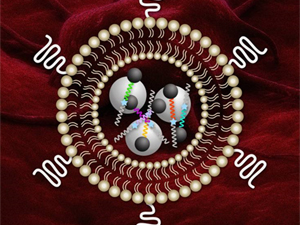



Date:04/10/16
 MIT researchers have designed nanosensors that can profile tumors and may yield insight into how they will respond to certain therapies. The system is based on levels of enzymes called proteases, which cancer cells use to remodel their surroundings.
MIT researchers have designed nanosensors that can profile tumors and may yield insight into how they will respond to certain therapies. The system is based on levels of enzymes called proteases, which cancer cells use to remodel their surroundings.
Once adapted for humans, this type of sensor could be used to determine how aggressive a tumor is and help doctors choose the best treatment, says Sangeeta Bhatia, the John and Dorothy Wilson Professor of Health Sciences and Technology and Electrical Engineering and Computer Science and a member of MIT’s Koch Institute for Integrative Cancer Research.
Once injected into the tumor site, the nanosensors are activated by a magnetic field that is harmless to healthy tissue. After interacting with and being modified by the target tumor proteins, the sensors are secreted in the urine, where they can be easily detected in less than an hour.
In a study of mice, the researchers showed that they could use these particles to correctly profile different types of colon tumors based on how much protease they produce.
Cancer treatments based on proteases, now in clinical trials, consist of antibodies that target a tumor protein but have “veils” that prevent them from being activated before reaching the tumor. The veils are cleaved by proteases, so this therapy would be most effective for patients with high protease levels.
The MIT team is also exploring using this type of sensor to image cancerous lesions that spread to the liver from other organs. Surgically removing such lesions works best if there are fewer than four, so measuring them could help doctors choose the best treatment.
Bhatia says this type of sensor could be adapted to other tumors as well, because the magnetic field can penetrate deep into the body. This approach could also be expanded to make diagnoses based on detecting other kinds of enzymes, including those that cut sugar chains or lipids.
Nanosensors could help determine tumors’ ability to remodel tissue
 MIT researchers have designed nanosensors that can profile tumors and may yield insight into how they will respond to certain therapies. The system is based on levels of enzymes called proteases, which cancer cells use to remodel their surroundings.
MIT researchers have designed nanosensors that can profile tumors and may yield insight into how they will respond to certain therapies. The system is based on levels of enzymes called proteases, which cancer cells use to remodel their surroundings.Once adapted for humans, this type of sensor could be used to determine how aggressive a tumor is and help doctors choose the best treatment, says Sangeeta Bhatia, the John and Dorothy Wilson Professor of Health Sciences and Technology and Electrical Engineering and Computer Science and a member of MIT’s Koch Institute for Integrative Cancer Research.
Once injected into the tumor site, the nanosensors are activated by a magnetic field that is harmless to healthy tissue. After interacting with and being modified by the target tumor proteins, the sensors are secreted in the urine, where they can be easily detected in less than an hour.
In a study of mice, the researchers showed that they could use these particles to correctly profile different types of colon tumors based on how much protease they produce.
Cancer treatments based on proteases, now in clinical trials, consist of antibodies that target a tumor protein but have “veils” that prevent them from being activated before reaching the tumor. The veils are cleaved by proteases, so this therapy would be most effective for patients with high protease levels.
The MIT team is also exploring using this type of sensor to image cancerous lesions that spread to the liver from other organs. Surgically removing such lesions works best if there are fewer than four, so measuring them could help doctors choose the best treatment.
Bhatia says this type of sensor could be adapted to other tumors as well, because the magnetic field can penetrate deep into the body. This approach could also be expanded to make diagnoses based on detecting other kinds of enzymes, including those that cut sugar chains or lipids.
Views: 392
©ictnews.az. All rights reserved.Similar news
- Azerbaijani project to monitor disease via mobile phones
- Innovative educational system to be improved under presidential decree
- NTRC prolongs license of two TV and radio organizations for 6 years
- Azerbaijan establishes e-registry for medicines
- Azerbaijani museum introduces e-guide
- Nar Mobile opens “Nar Dunyasi” sales and service center in Siyazan city
- International conference on custom electronic services held in Baku
- OIC secretary general to attend COMSTECH meeting in Baku
- Azerbaijan develops earthquake warning system
- New law to regulate transition to digital broadcasting in Azerbaijan
- Azerbaijani State Social Protection Fund introduces electronic digital signature
- Intellectual traffic management system in Baku to be commissioned in December
- Tax Ministry of Azerbaijan started receiving video-addresses
- World Bank recommends Azerbaijan to speed up e-service introduction in real estate
- Azerbaijan to shift to electronic registration of real estate





















